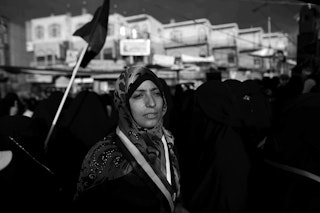
Tawakkol Karman
Journalist, politician, and human rights activist, at the heart of the pro-democracy youth uprising in Yemen. Known as the mother of the revolution, the iron woman, and the lady of the Arab Spring.
Featured lesson
Joining the Women of Peace and ChangeTawakkol Karman was born in 1979 in Taiz, Yemen’s third largest city, often described as a place of learning in a conservative country. In 1990, she witnessed the unification of North and South Yemen, followed by a civil war in 1994 in which the North triumphed. This led to dissidence in the South, as the repressive Northern government assumed control over the country.
Karman earned a master’s degree in political science from Sana’a University. A journalist by profession and human rights activist by nature, she responded to the political instability and human rights abuses in Yemen by mobilizing others and reporting on injustices. In 2005, she founded the organization Women Journalists Without Chains (WJWC), which advocates for freedoms and provides media skills to journalists. The organization also produces regular reports on human rights abuses in Yemen, documenting countless cases of attacks and unfair sentences against newspapers and writers.
From 2007 to 2010, Karman regularly led demonstrations and sit-ins in Tahrir Square, Sana'a. The protests targeted systemic government repression and called for inquiries into corruption and other forms of injustice. In 2011, she redirected the protesters to support the Arab Spring and even brought Yemen’s revolution to New York, speaking directly with United Nations Secretary General Ban Ki-Moon and organizing rallies at the UN headquarters. She said, “We are in the first stage of change in our country, and the feeling among the revolutionaries is that the people of Yemen will find solutions for our problems once the regime has gone, because the regime itself is the cause of most of them. A new Yemen awaits us, with a better future for all.”
Karman has always been fearless, bold, and outspoken. As a result, she has faced continuous threats and harassment by the government and has been imprisoned on a number of occasions for her pro-democracy, pro-human rights protests. Still, she always remains true to the culture of non-violence as the best means to fight political oppression and bring about institutional change.
She was awarded the Nobel Peace Prize in 2011 at age 32, one of the youngest people to ever receive it. She shared the Nobel Prize with two other female activists, Liberians Ellen Johnson Sirleaf and Leymah Gbowee, for their “non-violent struggle for the safety of women and for women’s rights to full participation in peace-building work.”
Today, Tawakkol Karman is married and the mother of three children. She remains fiercely committed to change and to pursuing the goal of journalistic freedom in Yemen. Along with her revolutionary comrades, she has proven to the world that the Yemeni people truly aspire for peace.
“At this moment, as I speak to you here, young Arab people, both women and men, march in peaceful demonstrations demanding freedom and dignity from their rulers. They go forward on this noble path armed not with weapons, but with faith in their right to freedom and dignity. They march in a dramatic scene which embodies the most beautiful of the human spirit of sacrifice and the aspiration to freedom and life, against the ugliest forms of selfishness, injustice and the desire to hold on to power and health.”
Help Us Protect Human Rights
Please give now. Your contribution will make a difference in the critical effort to achieve equal rights for all.